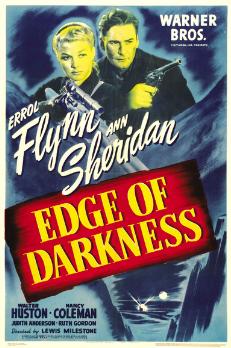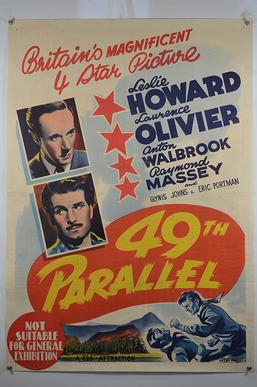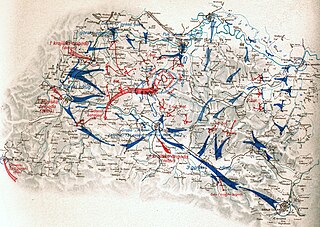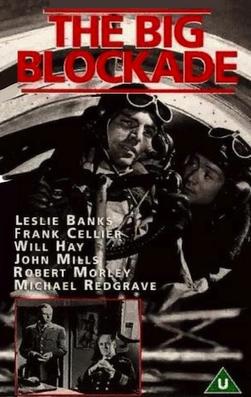This is a list of the most notable films produced in the Cinema of Germany in 1942.
This is a list of the most notable films produced in the Cinema of Germany in 1942.

Casablanca is a 1942 American romantic drama film directed by Michael Curtiz and starring Humphrey Bogart, Ingrid Bergman, and Paul Henreid. Filmed and set during World War II, it focuses on an American expatriate (Bogart) who must choose between his love for a woman (Bergman) and helping her husband (Henreid), a Czechoslovak resistance leader, escape from the Vichy-controlled city of Casablanca to continue his fight against the Germans. The screenplay is based on Everybody Comes to Rick's, an unproduced stage play by Murray Burnett and Joan Alison. The supporting cast features Claude Rains, Conrad Veidt, Sydney Greenstreet, Peter Lorre, and Dooley Wilson.

To Be or Not to Be is a 1942 American black comedy film, directed by Ernst Lubitsch, starring Carole Lombard and Jack Benny, and featuring Robert Stack, Felix Bressart, Lionel Atwill, Stanley Ridges and Sig Ruman. The plot concerns a troupe of actors in Nazi-occupied Warsaw who use their abilities at disguise and acting to fool the occupying troops. It was adapted by Lubitsch (uncredited) and Edwin Justus Mayer from the story by Melchior Lengyel. The film was released one month after actress Carole Lombard was killed in an airplane crash. In 1996, it was selected for preservation in the United States National Film Registry by the Library of Congress as being "culturally, historically, or aesthetically significant."

Audie Leon Murphy was an American soldier, actor, and songwriter. He was widely celebrated as the most decorated American combat soldier of World War II, and has been described as the most highly decorated soldier in U.S. history. He received every military combat award for valor available from the United States Army, as well as French and Belgian awards for heroism. Murphy received the Medal of Honor for valor that he demonstrated at age 19 for single-handedly holding off a company of German soldiers for an hour at the Colmar Pocket in France in January 1945, before leading a successful counterattack while wounded and out of ammunition.
Thousands of full-length films were produced during the decade of the 1940s. The great actor Humphrey Bogart made his most memorable films in this decade. Frank Capra's masterpiece It's a Wonderful Life and Orson Welles's masterpiece Citizen Kane were released. Citizen Kane made use of matte paintings, miniatures and optical printing techniques. The film noir genre was at its height. Alfred Hitchcock made his American debut with the film Rebecca, and made many classics throughout the 1940s. The most successful film of the decade was Samuel Goldwyn's The Best Years of Our Lives; the film was directed by William Wyler, and starred Fredric March, Myrna Loy, Dana Andrews, Teresa Wright, Virginia Mayo, and Harold Russell. The film won nine Academy Awards.

Der Fuehrer's Face is an American animated anti-Nazi propaganda short film produced by Walt Disney Productions, created in 1942 and released on January 1, 1943 by RKO Radio Pictures. The cartoon, which features Donald Duck in a nightmare setting working at a factory in Nazi Germany, was made in an effort to sell war bonds and is an example of American propaganda during World War II. The film was directed by Jack Kinney and written by Joe Grant and Dick Huemer. Spike Jones released a version of Oliver Wallace's theme for the short before the film was released.
UFA GmbH, shortened to UFA, is a film and television production company that unites all production activities of the media conglomerate Bertelsmann in Germany. The original UFA was established as Universum-Film Aktiengesellschaft on December 18, 1917, as a direct response to foreign competition in film and propaganda. UFA was founded by a consortium headed by Emil Georg von Stauß, a former Deutsche Bank board member. In March 1927, Alfred Hugenberg, an influential German media entrepreneur and later Minister of the Economy and Minister of Agriculture and Nutrition in Adolf Hitler's cabinet, purchased UFA and transferred ownership of it to the Nazi Party in 1933.

Edge of Darkness is a 1943 World War II film directed by Lewis Milestone that features Errol Flynn, Ann Sheridan, and Walter Huston. The feature is based on a script written by Robert Rossen which was adapted from the 1942 novel The Edge of Darkness by William Woods.

49th Parallel is a 1941 British war drama film, the third made by the team of Michael Powell and Emeric Pressburger. It was released in the United States as The Invaders.

Titanic is a 1943 German propaganda film made during World War II in Berlin by Tobis Productions for UFA, depicting the catastrophic sinking of RMS Titanic in 1912. This was the third German language dramatization of the event, following a silent film released in 1912 just four months after the sinking and the British produced German film Atlantik released in 1929.
Hans Dreier was a German motion picture art director. He was Paramount Pictures' supervising art director from 1927 until his retirement in 1950, when he was succeeded by Hal Pereira.

Invisible Agent is a 1942 American action and spy film directed by Edwin L. Marin with a screenplay written by Curt Siodmak. The invisible agent is played by Jon Hall, with Peter Lorre and Sir Cedric Hardwicke as members of the Axis, and Ilona Massey and Albert Basserman as Allied spies. The film is inspired by the 1897 H. G. Wells novel The Invisible Man.

Nazism made extensive use of the cinema throughout its history. Though it was a relatively new technology, the Nazi Party established a film department soon after it rose to power in Germany. Both Adolf Hitler and his propaganda minister Joseph Goebbels used the many Nazi films to promote the party ideology and show their influence in the burgeoning art form, which was an object of personal fascination for Hitler. The Nazis valued film as a propaganda instrument of enormous power, courting the masses by means of slogans that were aimed directly at the instincts and emotions of the people. The Department of Film also used the economic power of German moviegoers to influence the international film market. This resulted in almost all Hollywood producers censoring films critical of Nazism during the 1930s, as well as showing news shorts produced by the Nazis in American theaters.

Mrs. Miniver is a 1942 American romantic war drama film directed by William Wyler, and starring Greer Garson and Walter Pidgeon. Inspired by the 1940 novel Mrs. Miniver by Jan Struther, it shows how the life of an unassuming British housewife in rural England is affected by World War II. Produced and distributed by Metro-Goldwyn-Mayer, its supporting cast includes Teresa Wright, May Whitty, Reginald Owen, Henry Travers, Richard Ney and Henry Wilcoxon.

The Kozara Offensive, also known as Operation West Bosnia was a large-scale German-led counter-insurgency operation against the Yugoslav Partisans in the Bosnian mountain region of Kozara in the Independent State of Croatia during World War II. It was launched on 10 June 1942, with the goal to encircle and destroy the Partisans who were operating in the Kozara mountain region near Banja Luka, which threatened German access to the Belgrade-Zagreb railway.

The Big Blockade was a 1942 British black-and-white war propaganda film in the style of dramatised documentary. It was directed by Charles Frend and starred Will Hay, Leslie Banks, Michael Redgrave and John Mills. It was produced by Michael Balcon for Ealing Studios, in collaboration with the Ministry of Economic Warfare.

Heinrich Graf von Einsiedel was a German journalist, politician and World War II Luftwaffe ace.

Chetniks! The Fighting Guerrillas is a war film made by Twentieth Century Fox in 1943. The film starred Philip Dorn, Anna Sten, and Martin Kosleck.
World War II changed the possibilities for animation. Prior to the war, animation was mostly seen as a form of family entertainment. The attack on Pearl Harbor was a turning point in its utility. On December 8, 1941, the United States Army began working with Walt Disney at his studio, stationing Military personnel there for the duration of the war. The Army and Disney set about making various types of films for several different audiences. Most films meant for the public included some type of propaganda, while films for the troops included training and education about a given topic.